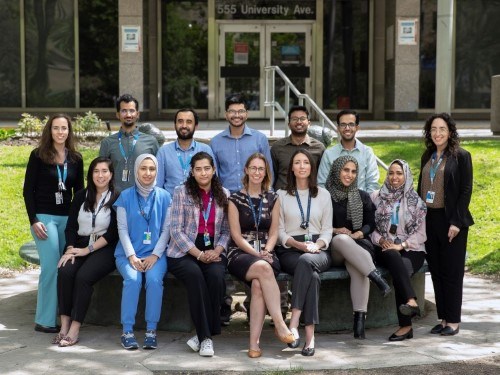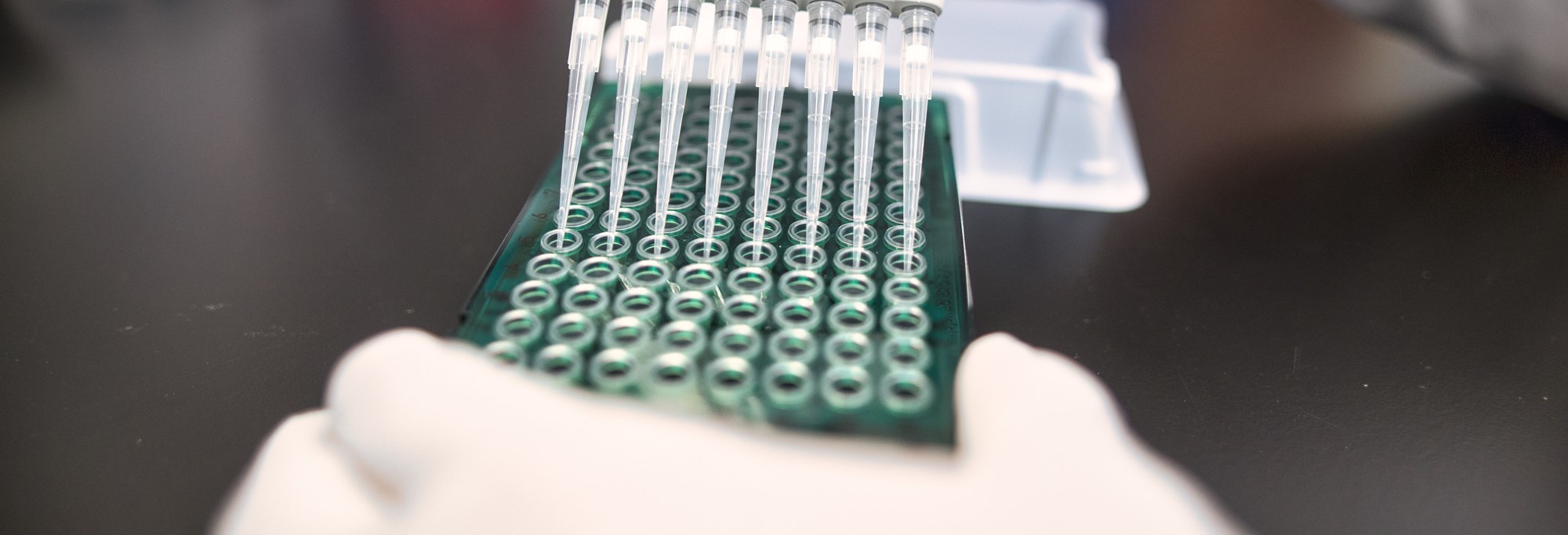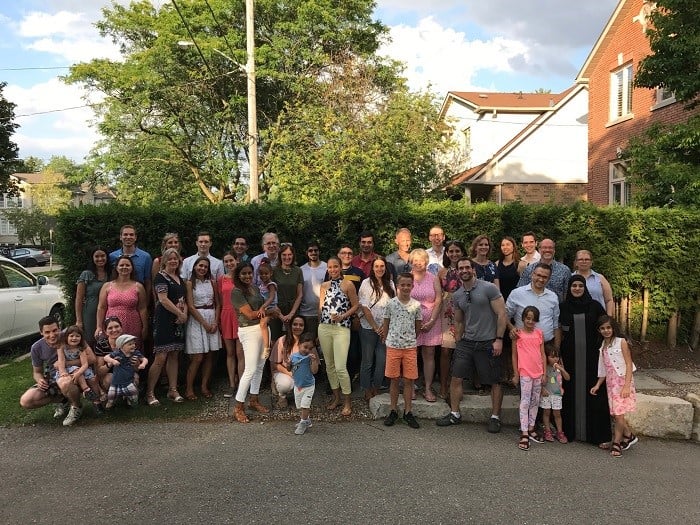Gastroenterology, Hepatology & Nutrition

Our objective at the Division of Gastroenterology, Hepatology and Nuturition (GHN) is to brighten the future for children with GHN disorders, through:
- Excellent, safe and innovative clinical care
- Cutting edge research
- World class training for the next generation of subspecialists
We maintain an international reputation as one of the world’s leading academic paediatric GHN centres of excellence.
Education and learning
The University of Toronto fellowship training program in paediatric gastroenterology, hepatology and nutrition is by far the largest in Canada and comparably sized to the premier training programs in this subspecialty in the United States.
Research activities
The Division of Gastroenterology and Nutrition hosts 12 full-time staff and three associate research staff.

What we do
Our goal is to provide high quality clinical care using an evidence-based approach whenever possible. All of the medical staff in the division are qualified to provide specialized care in their areas of expertise as well as in general GI, hepatology and nutrition.
The division is organized into three inpatient sections and our ambulatory program. The inpatient sections include: liver and small bowel transplantation (on ward 6A); general GI, nutrition and hepatology (on ward 6A); and a consultation team which provide consultative services across the hospital. We run a procedure facility on ward 4C for diagnostic and therapeutic endoscopy, biopsies, probes and manometry. This facility services both our inpatient as well as our ambulatory program.
Our ambulatory program has specialty clinics in cystic fibrosis, celiac disease, pancreatitis, GI motility, EGID (Eosinophilic gastrointestinal disease), hepatology, epidermolysis bullosa, Aerodigestive Clinic (TEF and congenital diaphragmatic hernia patients), IBD, general gastroenterology, liver and bowel transplant, GIFT (The Group for the Improvement of Intestinal Function and Treatment) and nutrition. The clinics are run as multidisciplinary teams, including flow coordinators, nurses, nurse practioners, dietitians, social workers and physicians.
Programs, clinics and services
Expand the sections below to learn more about each clinic.
Physicians: Dr. Tanja Gonska
Consultation clinic held within the CF Clinic. Alternates weekly between SickKids and St. Michael’s Hospital. Evaluation of CF patients with nutritional, pancreatic gastrointestinal and hepatobiliary disorders.
Please see the Cystic Fibrosis Clinic for more details.
Physicians: Dr. Michelle Gould and Dr. Margaret Marcon
This clinic consults on infants, children and adolescents who may have disorders of gastrointestinal motility and of gut-brain interaction. These include problems such as chronic resistant constipation, complicated GERD, dysphagia and intestinal pseudo-obstruction. The clinic also follows those with disorders like Scleroderma and Myopathies that affect GI motility along with their primary health care team. Some patients may be followed within the program and others directed to places within their community that can provide specialist care.
This team also oversees the GI Motility Testing Unit.
Physicians: Dr. Priscilla Chiu, Dr. Michelle Gould, Dr. Margaret Marcon, Dr. Theo Moraes and Dr. Augusto Zani
The Aerodigestive Clinic is a multidisciplinary clinic co-run by Gastroenterology, Respirology and Surgery. The clinic sees and follows children with congenital defects of the GI tract, lungs and airway. Occupational Therapy and Nutrition are active team members. Consultation with the Ear, Nose and Throat (ENT) Clinic is also involved if necessary.
Research
The team members oversee several disease specific registries as well as participating in national and international registries used to look at things like complication, procedural outcomes, and long-term outcomes. In addition, several team members have both clinical and basic science research in their respective areas:
Physicians: Dr. Nicholas Carman and Dr. Peggy Marcon
Eosinophilic gastrointestinal diseases, or “EGIDs” are diseases that are characterized by the abnormal infiltration of “allergy cells” or eosinophils in different sections of the gastrointestinal tract. The clinic follows patients with a known diagnosis of eosinophilic esophagitis (EoE), eosinophilic gastritis (EoG), eosinophilic enteritis (EoN), and eosinophilic colitis (EoC).
Eosinophilic Esophagitis is the most common of the EGIDs and can affect patients from infancy to adulthood. These conditions are diagnosed by endoscopy and biopsies.
Physicians: Dr. Margaret Marcon and Dr. Catharine Walsh
The Children’s Celiac Clinic provides specialized care and support for children and teenagers with celiac disease and their families. Our clinic is run by a core team of dedicated pediatric gastroenterologist, nurses and dietitians. We are committed to family-centered care as we believe families play an integral role in determining the best care plan to address their child’s unique needs.
In our clinic and with our research efforts, we aim to provide a holistic approach to treating children with celiac disease and their families. We provide support and education to help children transition to a gluten-free diet and improve their overall health and quality of life. Patients are followed in the clinic until they transition to adult care to help ensure they are following a strict gluten-free diet and they achieve the best possible health outcomes.
Our care is informed by the research we carry out related to celiac disease. Some of our patients and families choose to participate in our research projects, though this is entirely optional and does not affect other aspects of their care.
Physicians: Dr. Robert Bandsma and Dr. Jessie Hulst
Consultation clinic assessing patients with symptoms and diagnostic test results suggestive of nutritional problems, feeding intolerance, malnutrition, malabsorption, short-gut/intestinal failure.
Physicians: Dr. Daniela Gattini Valdes, Dr. Tanja Gonska, Dr. Michelle Gould and Dr. Simon Ling
Consultation clinic assessing patients with symptoms and diagnostic test results suggestive of gastrointestinal disease.
Please see Gastroenterology Clinic for more details.
Physicians: Dr. Mar Miserachs, Dr. Vicky Lee Ng and Dr. Simon Ling
Consultation clinic assessing patients with symptoms and diagnostic test results suggestive of gastrointestinal and/or hepatobiliary disease. There is a special interest in children with transplantation problems.
Physicians: Dr. Eric Benchimol, Dr. Nicholas Carman, Dr. Peter Church, Dr. Anne Griffiths, Dr. Alexio Muise, Dr. Amanda Ricciuto, and Dr. Thomas Walters
Follow-up of children and adolescents with Inflammatory Bowel Disease (e.g. Crohn’s disease and ulcerative colitis.)
Physicians: Dr. Yaron Avitzur and Dr. Vicky Lee Ng
Follow-up of paediatric liver and small bowel transplant recipients. Consultation of potential liver and small bowel transplant candidates
Physicians: Dr. Tanja Gonska
Consultation and follow-up of patients with symptoms and test results suggestive of diseases of the pancreas, such as acute recurrent and chronic pancreatitis, pancreatitis complications, pancreas tumors as well as patients with exocrine pancreatic insufficiency.
Physicians: Dr. Yaron Avitzur, Dr. Jessie Hulst and Dr. Daniela Gattini Valdes
The Group for the Improvement of Intestinal Function and Treatment (GIFT) is multidisciplinary team with representation from pediatric gastroenterology and surgery, nursing, dietetics, physio- and occupational therapy, social work, speech language pathology and psychology. The GIFT team is responsible for the management of children with intestinal failure requiring long-term parenteral nutrition or complex enteral nutrition rehabilitation.
Physicians: Dr. Aleixo Muise
The PIMID clinic consults on children or adolescents with:
- Crohn's disease or Ulcerative Colitis who have failed medical treatment or have severe or unusual form of forms of disease.
- Infants to rule out monogenic intestinal disease/IBD.
- IBD looking for precision treatment based on -omics (eg. precision use of biologics or small molecules)
- Other G/H/N patients with severe or unusual disease presentation who have failed genetic testing or testing is not available by panel or WES.
Minimum Clinical Eligibility Requirements
- Agree to clinical with specialized testing and research component (REB consent)
- Age < 2 years of age at onset of intestinal disease (many patients are referred older with early onset disease) for MOH genetics
- All other ages (including G/H/N) - SickKids sequencing
Key staff
Our physicians, nurses, allied health professionals, research and administrative staff work closely as a team to achieve our objectives in patient care, research and education.
Division Head:
Yaron Avitzur, MD
Director of Ambulatory Services:
Margaret (Peggy) Marcon, MD, FRCPC
Director of Fellowship Training Program:
Michelle Gould, MD & Eric Benchimol, MD, PhD, FRCPC
Expand each section below for listings of our key staff.
- Yaron Avitzur, MD, Staff Physician
- Robert Bandsma, MD, PhD, Staff Physician
- Eric Benchimol, MD, PhD, Staff Physician
- Nicholas Carman, MBBS, Staff Physician
- Peter Church, MD, Staff Physician
- Daniela Gattini Valdes, MD, Staff Physician
- Tanja Gonska, MD, Staff Physician
- Michelle Gould, MD, Staff Physician
- Anne Griffiths, MD, Staff Physician
- Jessie Hulst, MD, PhD, Staff Physician
- Nicola Jones, MD, PhD, Staff Physician
- Simon Ling, MD, Staff Physician
- Margaret (Peggy) Marcon, MD, Staff Physician
- Mar Miserachs, MD, PhD, Staff Physician
- Aleixo Muise, MD, PhD, Staff Physician
- Vicky Ng, MD, Staff Physician
- Amanda Ricciuto, MD, PhD, Staff Physician
- Catharine Walsh, MD, MEd, PhD, Staff Physician
- Thomas Walters, MBBS, MSc, Staff Physician
- Maria de Angelis, MScN, NP-Peds GI Transplant
- Christina Belza, BScN, MN, PhD, NP
- Karen Frost BScN, RN, MN, NP
- Elizabeth Garofalo, BScN MSc, PHC NP
- Stacey Lira, BScN, MN, NP-Peds
- Amrita Mundh, MN, NP-Peds
- Krista van Roestel MN-NP- Pediatrics
- Sylvia Wong-Sterling BScN, MN, NP
- Shonette Bhagwandin, BScN, RN
- Ashley Cruden, BScN, RN
- Cari Emery, BScN, RN
- Christine LeBannister, BScN, RN
- Jessica McDermott, RN
- Vikki Scaini, BA, RN
- Carina Silva, RN
- Jennifer Stunguris, RN - Liver and Bowel Transplant Program
- Krista Uusoue, RN (IBD Resource Nurse)
- Nada Yakubu, BScN, RN
- Megan Carricato, MSc, RD
- Julia Celestini, RD, BSc
- Vivian Cornelius, RD
- Glenda Courtney-Martin, MSc, PhD, RD
- Karen Kuperberg, MSc, RD
- Inez Martincevic, MSc, RD
- Dianna Yanchis, BSc, MSc, (c), RD
Margaret Johnson
Administrator
Phone: 416-813-6555
Fax: 416-813-6531
Email: margaret.johnson@sickkids.ca
Kamila McClean-Samuel
Administrative Assistant to: Drs. Mar Miserachs, Peter Church, and Residency Program, Elective and Observer Requests
Phone: 416-813-7654 x 424845
Fax: 416-813-4972
Email: kamila.mcclean-samuel@sickkids.ca
Julie Cho
Administrative Assistant to: Drs. Simon Ling, Tanja Gonska, and Nicholas Carman
Phone: 416-813-8757
Fax: 416-813-6531
Email: julie.cho@sickkids.ca
Shawana Estwick
Administrative Assistant to: Drs. Yaron Avitzur, Vicky Ng, and Robert Bandsma
Phone: 416-813-7654 ext. 422886
Fax: 416-813-4972
Email: shawana.estwick@sickkids.ca
Sherry Joy
Education Administrative Coordinator, Paediatric Gastroenterology Training Program
Phone: 416-813-6176
Fax: 416-813-4972
Email: sherry.joy@sickkids.ca
Suzanne Shek
Administrative Assistant to: Drs. Thomas Walters and Anne Griffiths
Phone: 416-813-7734
Fax: 416-813-6531
Email: suzanne.shek@sickkids.ca
Sandra Layno
Administrative Assistant to: Drs. Peggy Marcon, Jessie Hulst , Amanda Ricciuto and Michelle Gould
Phone: 416-813-7735
Fax: 416-813-6531
Email: sandra.layno@sickkids.ca
Davina Clarke
Assistant to Drs. Nicola Jones, Eric Benchimol and Daniela Gattini
Phone: 416-813-7733
Fax: 416-813-4972
Email: davina.clarke@sickkids.ca
Karoline Fiedler
Assistant to Dr. Aleixo Muise
Phone: 416-813-6858
Fax: 416-813-6531
Email: karoline.fiedler@sickkids.ca
Janice Bowers
Phone: 416-813-7654 x201490
Email: janice.bowers@sickkids.ca
Christina Devarapalli
Phone: 416-813-7270 ext. 2
Fax: 416-813-6526
Email: christina.devarapalli@sickkids.ca
Taylor Adams
Phone: 416-813-7270 ext. 1
Fax: 416-813-6526
Email: taylor.adams@sickkids.ca
Patient Information Coordinator
Alicia Nero
Phone: 416-813-5311
Email: alicia.nero@sickkids.ca
- Marley Tratner MSW, RSW
- Emily Ghent MSW, RSW
- Julia Hensley MSW, RSW

Our research spans the spectrum from basic and translational to patient-based in such areas as cystic fibrosis, inflammatory bowel diseases, nutrition and hepatology. Funding support (over $2 million dollars annually) presently includes grants from the CIHR, NIH, CF Foundation, Crohn’s and Colitis Foundation, the HJ Heinz Co. Foundation, Canadian Digestive Health Foundation.

Program mission
The University of Toronto Training Program in Paediatric Gastroenterology, Hepatology and Nutrition is based at The Hospital for Sick Children (SickKids) and maintains a strong tradition of training clinicians from all over the world for academic careers encompassing research, education and clinical care. The training program is the largest in Canada and comparably sized to the premier training programs in this subspecialty in the United States.
The training program is fully accredited in Canada, by the Royal College of Physicians and Surgeons. Training in Toronto is also fully recognized by the American Board of Pediatrics in the USA, and the Royal Australasian College of Physicians in Australia and New Zealand.
The core fellowship program follows a three-year structure with one clinical year followed by two research-focused years. Previous trainees who have completed the three-year fellowship program have been extremely successful in obtaining high caliber academic and leadership positions in Canada, the United States and around the world. Graduates of the program typically continue research activities and hold extramural grants to support their research programs.
We also offer one-year clinical training fellowships and subspecialty fellowship programs for advanced trainees who have completed the majority of their core training in Gastroenterology, Hepatology and Nutrition elsewhere.
Expand each section below to see important details.
During the first year of training, trainees are exposed to a large variety of clinical cases and to all aspects of ambulatory and inpatient paediatric gastroenterology, hepatology & nutrition (GHN). Trainees have a unique opportunity to engage in cutting edge medicine and state of the art clinical care. Clinical care is provided in an academic environment using an evidence-based approach under ongoing staff support and supervision.
During the first clinical year, trainees will rotate through the following services:
- General GHN inpatient service - general GI, IBD, non-transplant liver disease, feeding disorders, motility disorders and pancreatic disorders (usual census 6-12 patients).
- Transplant service – liver and intestine transplantation, acute liver failure and end stage liver disease (30-35 liver transplants annually; usual census 5-10 patients).
- Consult service – consultation services to the hospital in-patient wards and to community-based practitioners
- GIFT service – intestinal failure training (usual census 5-8 patients).
- Adult gastroenterology – one month of adult gastroenterology and endoscopy training.
- Outpatient clinics – general GI and specialized clinics in IBD, hepatology, nutrition, motility disorders, celiac, intestinal failure, liver transplantation, pancreatic diseases and other.
- Paediatric procedures – upper and lower endoscopies, variceal band ligation, polypectomy, foreign body removals. Each trainee performs 150-200 pediatric procedures during the first year of training.
On-call service
Overnight and weekend on-call coverage for patients admitted to the GHN and transplant inpatient services is provided by core fellowship trainees during their three years of training. Trainees provide call from home and provide support for general paediatrics residents who remain in hospital overnight. Trainees may need to come to the hospital during their call. Call frequency is roughly one night each week and one weekend each month.
Funding
Salary support is available on a competitive basis from either the Ontario Ministry of Health and Long-Term Care (for Canadian trainees) or SickKids (for international trainees for the first two years of training). Third year funding is obtained on a competitive basis through supervisor, divisional, hospital or extra-mural sources. Traditionally all of our research trainees successfully obtain salary support from these sources for their last year of research training.
The second and third years of the Core Fellowship Program are primarily focused on research training. There are a vast number of opportunities for high caliber clinical, translational or basic science research within the division, within the SickKids Research Institute and at the University of Toronto. The Research Institute (RI) is the largest hospital-based research program in Canada, and is among the largest paediatric research programs in the world.
The multidisciplinary structure of the RI encourages collaborative research, as does its new home in the Peter Gilgen Centre for Research and Learning. Areas for research training are chosen by discussion between the trainee and potential supervisors, according to the interest of the trainee and the interests and expertise within our division and the RI.
Specific areas of research within the division include basic science, clinical and translational science, epidemiology and education.
Trainees can undertake a postgraduate degree program (M.Sc, M.Ed, PhD) offered at the University of Toronto (e.g., programs in Institute of Health Policy, Management and Evaluation, Institute of Medical Sciences, Ontario Institute for Studies in Education, Department of Physiology or Department of Pathology Laboratory Medicine) or distance education programs offered by other Universities. A substantial number of trainees (50 per cent over the last decade) have pursued concurrent degrees during their research training.
The GI training program at SickKids provides opportunities for advanced clinical and research training in specific domains of paediatric gastroenterology. The advanced subspecialty fellowship training programs include inflammatory bowel disease (IBD), hepatology and liver transplantation, intestinal failure (GIFT), Advanced Clinical Nutrition and Precision Inflammatory Bowel Disease and Monogenic Intestinal Diseases (PIMID).
Inflammatory Bowel Disease - (IBD)
A one-year advanced IBD clinical and research training fellowship is available for interested trainees and is supported through the SickKids IBD Centre.
Canada has among the highest incidence rates for IBD worldwide. Ontario health administrative data suggest that the incidence is continuing to increase, particularly in children. IBD care is centralized within the Gastroenterology, Hepatology and Nutrition (GHN) Division, such that three IBD specialists provide ambulatory care in six “half-day” IBD clinics weekly with over 2000 patient visits annually. IBD patients also account for the majority of inpatient days on the “GHN” ward. Ten to twelve patients are newly diagnosed each month and remain under follow-up care until the time of transfer to adult care by age 18 years. The SickKids IBD Program is hence responsible at any given time for the care of 900 children and adolescents with Crohn’s disease and ulcerative colitis, making it one of the largest paediatric IBD programs worldwide.
The IBD ambulatory program includes three specialty clinics. Dr. Aleixo Muise, co-lead of the international NEOPICS consortium, which has been very successful in identifying monogenic forms of IBD, runs a very-early onset IBD clinic. There is an alternate weekly “anti-TNF” therapy clinic exclusively for patients being treated with biologics, and a periodic joint clinic with Dr. Simon Ling, for the care and study of patients with PSC-IBD.
All fellows in the GI/Hepatology/Nutrition training program are given multiple opportunities for small group learning including new patient IBD rounds, challenging IBD patient rounds, IBD teaching rounds for fellows, and Magnetic Resonance Imaging rounds, all held once in every two weeks.
The IBD program aspires always to integrate state of the art clinical care with meaningful patient-based and translational research. The program has had remarkable opportunities to train the next generation of paediatric IBD specialists, and in networking internationally to advance IBD research and clinical care. The Canadian Children IBD Network: a joint partnership of CIHR and the CH.I.L.D. Foundation is led by the SickKids IBD program.
Group for Improvement of Intestinal Function and Treatment - (GIFT)
Advanced training in intestinal failure and rehabilitation is provided by the SickKids intestinal rehabilitation program (GIFT – Group for Improvement of Intestinal Function and Treatment). The GIFT program is the largest of its kind in Canada and one of the leading intestinal rehabilitation programs in the world with 20 to 25 new patients every year. The program follows a large variety of patients with intestinal failure ranging from short bowel syndrome to severe motility disorders and congenital diarrheas in an inpatient and outpatient setting. The inpatient service is an independent service with daily census of 5 to 10 patients / day. A multi-disciplinary team of paediatric gastroenterologists, paediatric surgeons, nurses, dieticians, physiotherapists, oral therapists, social workers, and others provide comprehensive daily care. Clinical, translational, and basic research is an integral part of the program activities and multiple opportunities exist for interested trainees under the supervision of Dr. Yaron Avitzur, Dr. Jessie Hulst and Dr. Daniela Gattini Valdes, paediatric gastroenterologist.
Intestinal failure training is focused on clinical and research training in the field of intestinal failure and rehabilitation. Training is offered for a one-year period for fully trained general gastroenterologists or general surgeons and is recognized by the University of Toronto. Funding is provided on a competitive basis through SickKids Transplant Centre.
Hepatology and Liver Transplant
Advanced training in paediatric hepatology and liver transplantation is provided by the Division of Paediatric Gastroenterology, Hepatology and Nutrition and the Liver Transplant program at SickKids*.
Our one-year program provides flexible training to meet the needs of each individual fellow, whether their focus is advanced hepatology training, training in liver transplantation, or research training. Our overall aim is to train the future leaders in this field across the world. SickKids currently performs between 25 and 40 paediatric liver transplants per year, and has completed more than 500 paediatric orthotopic liver transplants, including over 150 from live donors, since the first SickKids paediatric liver transplant in 1986. Our clinical service includes four paediatric hepatology clinics, a liver transplant clinic each week and a busy inpatient liver transplant service. We work closely with our partners at the University of Toronto Transplant Institute and Toronto Liver Centre.
During this year of training, the Hepatology and Liver Transplant Fellow will gain clinical mastery in a wide range of general acute and chronic liver conditions, including care of patients with neonatal cholestasis, abnormal liver tests, end-stage liver failure, fulminant liver failure, hepatic neoplasms, metabolic liver conditions, portal hypertension, viral hepatitis, biliary diseases, vascular malformations of the liver; diagnosis of immune-mediated liver diseases and cholestasis syndromes; assessment of the candidacy of patients for liver transplantation; management of paediatric patients pre- and post-liver transplantation; and long-term post-liver transplantation care. Fellows will interact closely with subspecialists in other divisions, including critical care medicine, interventional radiology, pathology, metabolic genetics, and transplant surgery. Fellows will develop diagnostic and therapeutic expertise in areas of hepatology and nutritional disorders and develop proficiency in the performance of diagnostic and therapeutic procedures (ie. endoscopic variceal band ligation); observation of procedures (including liver transplantation, percutaneous cholangiography), and non-transplant hepatobiliary surgeries (including Kasai portoenterostomy, partial external biliary diversion, shunt surgery); interpretation of liver histopathology; organizational structure and administration of a liver transplant program.
Clinical, translational and basic research is an integral part of the program activities and multiple opportunities exist for interested trainees under the supervision of faculty hepatologists within the Division of Paediatric Gastroenterology, Hepatology, Nutrition and Liver Transplantation to complete a mentored concise clinical or translational research project.
Clinical Nutrition
A one-year Advanced Clinical Nutrition Fellowship with clinical and research training is available for interested trainees and is aimed to prepare individuals for an academic career in paediatric nutrition. A training experience best suited to the background and long-range goal of the individual trainee will be facilitated by appropriate guidance and mentorship by dr. Jessie Hulst and dr. Robert Bandsma who are the clinical leads of the Nutrition Program within the Division of Gastroenterology, Hepatology and Nutrition (GHN).
Trainees will attend our program for a total of one year, devoted to clinical and research exposure in the field of paediatric nutrition. The fellow will be exposed to the broad aspects of nutrition in clinical paediatrics within the Division of GHN and through their clinical services. The fellow will also be able to participate in a selection of other subspecialty care areas (clinics or inpatient) requiring nutritional evaluation and management, including areas within GHN (Specialized Nutrition, Liver transplant, Intestinal Rehabilitation (GIFT), Home Parenteral Nutrition, Inflammatory Bowel Disease, Eosinophilic Esophagitis, and Cystic Fibrosis) and outside GHN (G-tube program, Feeding clinic, preterm nutrition, and critical care nutrition).
Clinical and research experience will be integrated by ongoing participation in organized program activities and interaction with education activities of the Division of GHN including clinical teaching rounds, hospital-wide nutrition rounds, journal clubs and research seminars).
Clinical and translational research is an integral part of the Nutrition program activities and multiple opportunities exist for interested trainees.
Precision Inflammatory Bowel Disease and Monogenic Intestinal Diseases - (PIMID)
(This is a two-year fellowship. The next competition will be for fellowships starting July 1, 2027. Pre-screening will begin on December 1, 2025)
The Precision Inflammatory Bowel Disease and Monogenic Intestinal Diseases (PIMID) clinic provides multi-disciplinary care to children and adolescents with severe forms of IBD and gastrointestinal/hepatologic/nutrition disease using multi-omic approaches. We will use state-of-the-art approaches to establish (A) genetic variants causing disease and/or (B) druggable pathways driving disease to: determine the correct biologic/targeted small molecule therapy; predict disease course and prevent negative outcomes; predict need for surgery (leading to earlier intervention and/or the correct procedure); and implement both pharmacologic and nonpharmacologic interventions including medication, dietary or microbial-based interventions.
The goal of the fellowship program is to provide the applicant with a structured experience that not only allows them to become expert clinicians in the advanced management of Pediatric IBD and suitably resourced to develop a Pediatric IBD specialist care program, but also to ensure they develop a skill set that will equip them to become leading academic clinicians capable of moving forward the field of Pediatric IBD Clinical care. A training experience best suited to the background and long-range goals of the individual trainee will be facilitated by appropriate guidance and mentorship. This fellowship includes rotations in PIMID Ambulatory Clinic, Consult to PIMID Inpatients, and Research Training, all of which will take place at SickKids. Clinical and research experience will be integrated by ongoing participation in organized divisional activities (including weekly clinical teaching rounds, journal clubs, pathology rounds and research seminars). Broad interaction and integration with other disciplines within the Research Institute will also be encouraged dependent upon the nature of the individual research projects they embark on. Progress towards their goals will be regularly reviewed throughout the period of training.
Note to US Citizens: This one-year training program is not yet RCPSC or ACGME-accredited and training therefore may not be accepted towards the Certificate of Added Qualification (CAQ) from the American Board of Pediatrics.
International applicants interested in applying for the three year training program or the one year clinical training program should be certified pediatricians in their home country. Interested applicants should send a copy of their CV for first round screening between November 1, 2024 - December 1, 2024 for fellowships starting July 1, 2026.
Applicants interested in advanced subspecialty fellowship training program should be either a certified Paediatric Gastroenterologist, completed successfully paediatric gastroenterology training in accredited training program or are considered Paediatric Gastroenterologist in countries with no formal accreditation or certification process. Interested applicants should send a copy of their CV for first round screening between December 1, 2024 - February 1, 2025 for fellowships starting July 1, 2026.
Applicants who have applied to the U.S match through the National Residency Matching Program (NRMP), please be advised that the University of Toronto is a participating institution and adheres to the match policy. The policy states that "Applicants who have matched to a program or have accepted a position during the Supplemental Offer and Acceptance Program (SOAP), shall not apply for, discuss, interview for, or accept a concurrent year position in another program prior to the NRMP granting the requested waiver." For more information, visit: NRMP.org
For Canadian Applicants CaRMS website.
For sponsored Non-Canadian Applicants
For further details please contact:
Michelle Gould, MD, MSc, FRCPC
Training Program Director
Staff Gastroenterologist, The Hospital for Sick Children
University of Toronto Paediatric Gastroenterology, Hepatology and Nutrition Fellowship Program
Phone: 416-813-6406
Fax: 416-813-4972
Email address: michelle.gould@sickkids.ca
Sherry Joy
Education Administrative Coordinator
Division of Gastroenterology, Hepatology and Nutrition
The Hospital for Sick Children
555 University Avenue
Toronto,
Ontario M5G 1X8
Canada
Phone: 416-813-6176
Fax: 416-813-4972
Email: sherry.joy@sickkids.ca

Read about the personal experiences of Researchers and Fellows at SickKids.
Academic events and symposiums
Educational rounds
Teaching and education are an integral and dominant part of the division’s activities. An academic half day occurs every week and is dedicated to GHN teaching by faculty and invited speakers. Local, national and international leading experts in GHN routinely present during our bi-weekly research rounds and provide outstanding opportunities for networking between trainees and invited speakers. Additional rounds focus on specific areas in GHN and allow trainees to achieve deep understanding in these domains. Please refer to the table below for a full list of education rounds.
By the week
| Monday |
|
|
| Tuesday |
|
|
| Wednesday |
|
|
| Thursday |
|
|
| Friday |
|
|
Other important local academic activities include:
- Department of Paediatrics Annual Research Day
- Annual Adult and Paediatrics GI Research Day
Extra-curricular activities (on hold for COVID-19)
We plan several social activities for fellows in the program. Despite busy work schedules, fellows find time to socialize and enjoy Toronto!
Scheduled social activities include:
- Divisional Holiday Party (annually in December) – this is a formal event attended by close to 100 Divisional members, faculty, fellows, nurses, allied health professionals and administrative assistants. An excellent example of how the Division comes together for fun, food and dancing!
- End of Year Rounds – an annual event when the fellows sing, dance and act their way through a fun-filled poke at the faculty and Division.
- Divisional summer get-together – a divisional event for fellows and faculty during the summer months to welcome the first year fellows.

2018 - 2019 Summer BBQ
Toronto is an incredibly diverse, safe and exciting city to live in and enjoy. The city is home to several world-class museums, art galleries, theatres and concert halls. In the winter, fellows regularly participate in easily accessible skiing and skating. For additional information on life in Toronto for medical trainees please use the University of Toronto's Post Graduate Medical Education office site.
Contact Gastroenterology, Hepatology and Nutrition
- Phone: 416-813-7270
- Email: gi.clinic@sickkids.ca
For any questions or concerns related to patient or patient appointments, please contact the GI clinic.
Clinic referrals
Referrals are accepted through EpicCare Link.If EpicCare Link is down please fax paper referrals to: 416-813-6526.
Administrative support staff
For enquiries related to academic work, please contact the administrative support staff listed under the relevant staff physicians.
For clinical enquiries, please contact the Patient Care Information Coordinator or the relevant clinic nurse or nurse practitioner.
Our History
The Division of Gastroenterology, Hepatology and Nutrition is a world-class academic program, which has established a superlative national and international reputation for its achievements in clinical and laboratory based research, postgraduate training and clinical care.
Prior to 1994, the division was comprised of two distinct entities, namely the Division of Gastroenterology and the Division of Clinical Nutrition.
The Division of Gastroenterology was first established in the 1960's, under the able leadership of Drs. Andrew Sass-Kortsak and J. Richard Hamilton. The Division quickly emerged as a world-class, academically focused leader of the sub-specialty.
The Division of Clinical Nutrition was established under the leadership of Dr. Paul Pencharz, who was recruited in 1978 to clearly delineate and establish clinical nutrition as a medical/surgical discipline at SickKids.
Both former divisions adopted an “integrated” academic model with combined clinical, educational and academic goals and objectives; thus, the former Division Chiefs of each division assumed combined responsibilities under the umbrella of the Department of Paediatrics and the Research Institute. In 1993, the two divisions were amalgamated under the leadership of Dr. Peter Durie.

